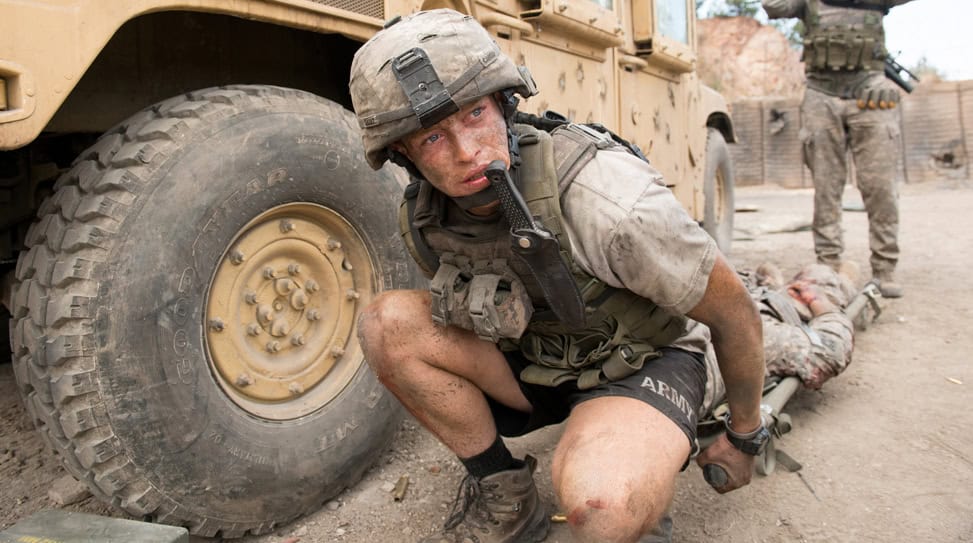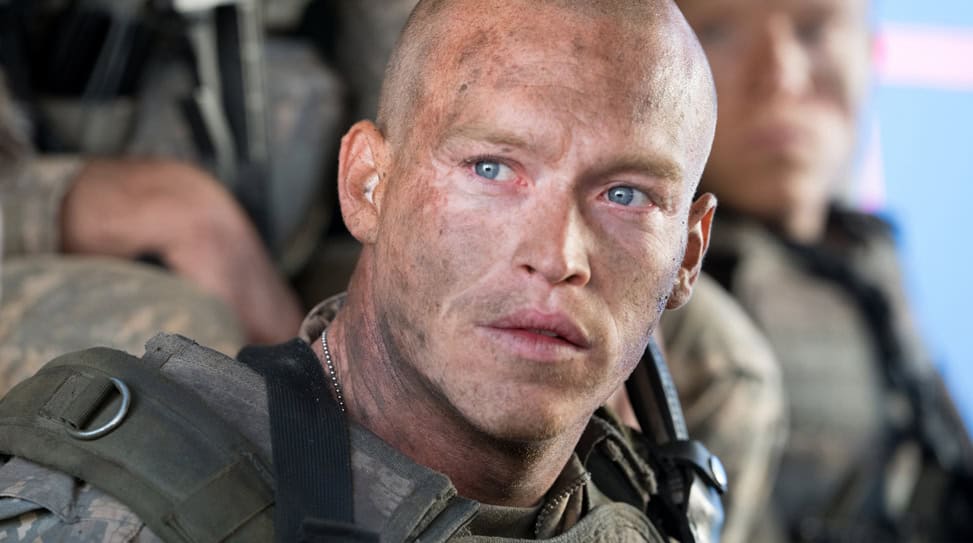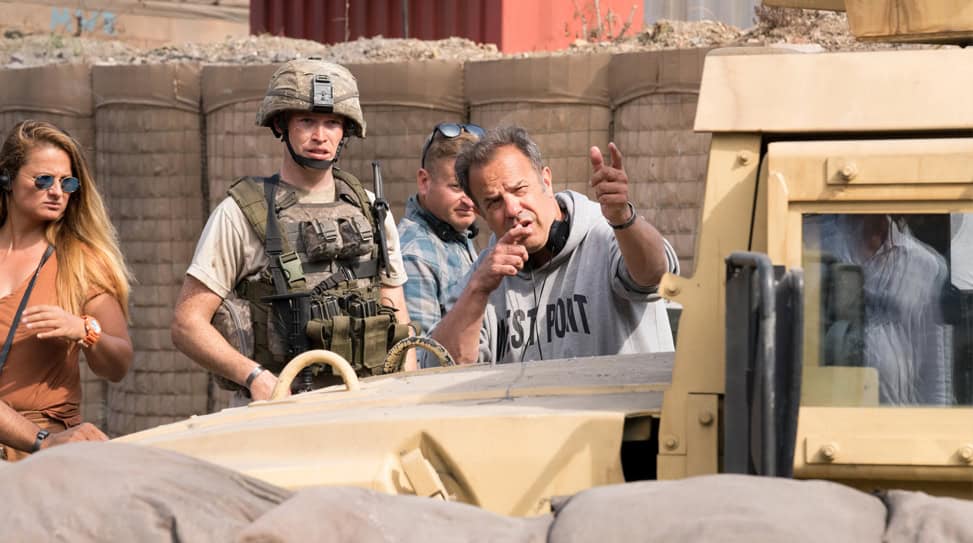To be honest, a lot of the jobs that I’ve had the pleasure of getting to do have scared the shit out of me for one reason or another.
Speaking to Caleb Landry Jones, one of the great chameleonic actors of his generation, it quickly dawns on you that he’s delightfully—and jarringly—contrary to his onscreen personas: Often a destabilizing wildcard presence across his many roles in both film and television. He’s somebody whose portrayals tickle your curiosity about them, taking you far beyond the craft itself.
In 2014, at the New York Film Festival, Josh and Benny Safdie unveiled their unromanticized yet lyrical Heaven Knows What, a film that came about when the brother directing duo happened upon Arielle Holmes, at the time a functioning heroin addict. The film weaves together elements of Holmes’s real-life experiences with fictional encounters and characters, including one played by Jones, the biggest name the Safdies had worked with up to that point. Junkies scream at each other incoherently on sidewalks and move erratically through crowds, pursuing, with glazed eyes and matted hair, dramas that only they can see. They shoot up in parks and inside fast food restrooms, shoplift, and con each other into and out of their stashes. Jones’s performance in that film scared everyone shitless, to the point that, absurdly, you wondered just how much acting that had required.
Jones, 30, got his auspicious start in acting working with another brother directing duo, Ethan and Joel Coen, on the Best Picture Oscar winner No Country for Old Men. Credited simply as Boy on Bike, he did have a speaking part. A little over a decade into his career now, the Texas native has done both big movies and smaller ones—some more memorable than others. He has been the guy who traffics in “celebrity viruses” in Brandon Cronenberg’s Antiviral, the even-creepier son in a racist family in Jordan Peele’s Get Out, and the dude who gets thrown out a window by Sam Rockwell in Martin McDonagh’s Three Billboards of Outside Ebbing, Missouri. He has worked with a coterie of bonafide cool filmmakers like David Fincher, Neil Jordan, Xavier Dolan, Sean Baker, David Lynch, and Jim Jarmusch. These characters, however—all of them—are not Jones.
Nor is he the character he portrays in Rod Lurie’s The Outpost. Based on the best-selling book The Outpost: An Untold Story of American Valor, authored by CNN correspondent Jake Tapper, the film follows a unit of U.S. soldiers secluded at Combat Outpost Keating, deep in the valley circled by mountains in Afghanistan. The Battle of Kamdesh, or “the most heroic battle of the Afghanistan war” as it is also known, was the bloodiest American engagement of the Afghan war in 2009. 54 U.S. soldiers held off 400 Taliban insurgents and their coordinated attack. Bravo Troop 3-61 CAV became one of the most decorated units in the 19-year conflict. The battle was the first time in 50 years that two living servicemen were recognized with the Medal of Honor for their actions, including Ty Carter, who is portrayed by Jones and also served as a technical advisor on the film.
When Anthem reached out to Jones via Zoom, he was hanging out in his parents’ barn in Texas.
The Outpost arrives in select theaters and On Demand on July 3rd.
Last night, I dreamt that I slept through our scheduled Zoom chat. This is a real relief to me right now. Then I got to wondering if your anxieties might come out in your dreams when you’re on a shoot, especially on a project like The Outpost, which is truly immersive.
I can’t remember any dreams in particular on this film, but absolutely! When I first moved to Los Angeles, I got the job on X-Men: First Class. That was kind of my first job out in L.A. Also, I got The Social Network job, which I didn’t know how big it was gonna be. I remember going to England and having a dream where, in a nutshell, an angel told me that I would lose everything and I would have to work like hell to get it back. I remember waking up and that day forward going, “Whatever you do, you stick to your instincts, man!” [laughs] “When you get there on set and you’re nervous and you’re worried because everybody else has been doing it a lot longer than you and they know what they’re doing and they’re really good, you just stick to your instincts, man! You got the job for a reason. Don’t know why. But stick to your instincts!” That dream was horrifying, but at the same time, it probably helped me a lot in films because I got there and I listened to my instincts, which is good. That’s part of the reason I was getting hired, I think, to some extent. You need lines, too. That’s important.
You’re working with a wealth of information on The Outpost. It’s based on true events. Ty Carter is a real person that you’re portraying. He was a technical advisor on the film. So how do you balance out the desire to do him justice and also make the character your own?
Well, [Ty] was really great in a lot of ways, but in one way in particular just being really, really open to me. I didn’t take him up on all the openness that he would’ve probably allowed and I’m sure to some degree that was me needing to, like you said, somehow make it maybe more personal. I don’t really know what the reason was. But I went to his home. He picked me up from the airport. We hung out for quite a while. We got some food. He took me around town in his neighborhood. We talked like you and I now, just talkin’, not about The Outpost necessarily. Kind of anything. But at the same time, it was always coming back to The Outpost. I think he wanted to know that I was going to, first off, lose the Texas accent. Second, that I would do him justice. I’m scrawnier than he was. He had quite a bit more muscle to him. He was in a different build as well. I think he looked at me going, “Oh no…” [laughs] It was great to know that he was open and that I could ask him anything because it allowed me to take certain liberties to allow myself to go about it in a way that I needed to go about it, however that was. It was also fortunate that he was on set. He was there for about two weeks, maybe longer. He was there beforehand and came back while we were shooting. There were very important scenes. They’re all important scenes. There are scenes involving Mace [played by Chris Born], arguing in the tank about going out to get him, to bring him back, and what should be done. There’s always a few moments in every script I feel like I’m really scared of, or I see what they’re supposed to be and I don’t know how to achieve that. That was one instance. My older brother was there, too, and he’s a Marine. Him and Ty were in a booth together watching the monitor. Rod [Lurie] was on the other monitor. So I knew very quickly if I wasn’t showing the fear enough or if I wasn’t showing the anger enough, or if it was right or not. Pardon my French, but it scared me shitless just the idea of Ty and my older brother watching it, and more so I think my brother. At the same time, it was great because it forced me to get over a hump real fast.
I do know that you shared The Outpost script with your brother before committing to the project. I’m guessing he was your barometer for authenticity? What did you want to know?
Yeah, absolutely! I wanted to know if it’s right. I wanted to know if the script is dry, and what it was doing. He’d know real quick! “Caleb, it’s a good story, but this is all bullshit here what happens on page 30.” I’ve gotten a few military scripts before and I’ve always sent them to him to see what his thoughts are. I’ve come across a piece before where he read it and said, “Caleb, a Marine would never do that,” and the whole third act hinges on it. He’s like, “I’m telling you, no Marine would ever do that,” and I’m going, “Okay, well, can’t do that job because they obviously don’t know what they’re talking about.” Or they’re romanticizing an aspect of war and that isn’t how it is. It’s not something to be taken lightly by any means. The fact that my brother has done this for me and for our family and for everybody—I’m lucky that he knows what it really is to be able to help me, to be able to help others, to inform others of a reality that exists. So I feel like it would be pretty dumb if I didn’t send it to him first, because I don’t know the first thing about war.
I know Rod served in the Army, and the film is dedicated to his son who passed away. This impassioned quote from Rod is quite something: “I will never in my life ever do anything as important as this—as a soldier and as a dad.” That has to be infectious to the people involved, both cast and crew.
Yeah, I think very early on he set a precedent for everyone to follow and that was key in a lot of ways to just how [the movie] exists. He has everything planned out to a T to a large extent, of movements, camera. He wanted to build a set so that he could flow throughout the set. It enabled him to work in a way that you don’t usually get to work in. I’ve never been a part of a film like this before, and I doubt I ever will be again. I think it’s safe for Rod to make a statement like that because he really means it. He wore it on his sleeve every single day, every single moment, chomping at the bit ready to go. He was a part of every aspect of that film in a way that, I suppose, a lot of directors aren’t for whatever reason. He made sure that every facet of it fit this or that way, finding ways around problems and not taking no for an answer. As an actor, sometimes it was like, “Rod, get out of here!” [laughs] He’s like, “I know, I know, I know! I get it, I get it, I get it! I know!” That’s how much this means to him, you know? Like you said, it was infectious. I’d say very much so for everyone, especially those first two weeks when I got there and did a short bootcamp. Ray and Jariko [Denman], two soldiers who were teaching us how to fire the weapons and how to move like a soldier, were teaching—I’ll speak for myself—this idiot how to at least make it look real. Like Rob was able to set a precedent in one way, these guys were able to set it in another way being soldiers themselves. They went soft on us. At the same time, it was too hard for some of us. Some of us I think were crying a bit because it was nothing like what we thought it would be like. It’s like, “They’re doing the real thing!” [laughs] At the end of the day, you got a bunch of actors in a room.
The first time that you made a huge impression on me was when you played Ilya in Heaven Knows What, which I consider one of the great masterpieces of contemporary cinema. I was scared of you then. Similarly, when I watched Tyrel, I wondered if you might be like that in real life. It’s of course absurd to project the artist onto the characters they play.
Yeah. You do it without thinking, also. I think we all do it. I do it, too. Then I work with [those actors] and go, “You’re not like that at all!” [laughs] And then it’s hard for me to watch the rest of their work.
Your body of work showcases diverse characters that often skew a certain way, whether its been called unconventional or marginal or what have you. They’re nothing if not distinct and totally yours. What new role do you want that you think might freak you out a little bit?
I mean, jeez, Heaven Knows What was that at the time. I got the script and flew out a day or two later. That was one of the many reasons I was so scared, you know what I mean? I didn’t know whether I would be able to pull it off just because I wasn’t even sure what my part of the puzzle was until I got there. I think I got it in the script, but when I got there [the Safdie brothers] also really emphasized what my part to play was in this group of young men. But man, to be honest, a lot of the jobs that I’ve had the pleasure of getting to do have scared the shit out of me for one reason or another, even if it’s something technical. Pretty much every job has a scene or two that I have no idea how to pull off, much less the entire character. There’s always fear and doubt. The only way to do it is to be fearless to an extent and I wish I was more fearless in the last ten years. At the same time, maybe I’m more fearful now than I was then because I was a little younger. I’ve been really lucky because I wanted acting to be something extremely immersive and physical, and I’ve been very fortunate and blessed that a lot of the work that I’ve gotten to do have been that. To do that in film is interesting, then you do it a few times and they want you to do it some more. My favorite actors have always been ones that can play very different parts. The character actors more so, I suppose, playing parts that I don’t know how they ever thought they could play based on seeing them in another part. I see them in a part going, “I wonder if they knew that they were gonna be able to do it.” I find that putting yourself in that situation is very interesting because you’re grasping at straws in one way. The next [film] I’m gonna do is scaring the shit out of me at the moment, and the last one I did had stuff where I was banging my head against the wall. I felt really lucky on [The Outpost] because we shot it in chronological order for the most part, which never happens. Once again, because of how he sees the film and how he wants to make it, Rod made sure that everyone’s schedules allowed for that to happen. As for my character, maybe I was still finding something early on. I didn’t feel comfortable very much at all and I think that works in the film in this odd way. Towards the second and third act, I’m as an actor becoming more confident in myself in this role. I think it’s interesting how that kind of thing works. I’m not sure how it all really works. I know you can do so much work, but at the end of the day you still might feel like a puppet or a clown, or feel phony or fake. I find that if I can make it physical, then I have a greater chance at finding something primal or something that I can’t escape within me that exists—something that also exists within time or another human being. But I don’t even know what that stuff is. [laughs] I’m not sure how that all got to this.
You are that versatile actor you admire in others. It was great talking to you, Caleb.
Thank you very much. Treat your mom really good over the next however long you’re over there, and I’ll do the same. We’ll stay out of all the restaurants and stores if we can help it.
And keep those masks on.
Holy smokes! Well, if you were over here in Collin County, Texas, you’d see that not a lot of people are wearing masks, which I don’t understand. A lady told me at a gas station last week how paranoid I was: “Son, you need to know when you’ve been had!” or something like that. [laughs] I’m like, “Oh my god… Oh man…” But you don’t wanna be like—anyways. Stay safe!




 A Conversation with Sean Wang
A Conversation with Sean Wang A Conversation with James Paxton
A Conversation with James Paxton
No Comments